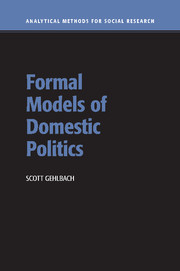4 - Veto Players
Published online by Cambridge University Press: 05 March 2013
Summary
All of the models we have considered so far implicitly assume a single policy maker. However, in many political environments policy can be changed only with the agreement of multiple actors. Such actors—those with the ability to block a change from the status quo—are known as veto players. Veto players might derive their power from a country's constitution, as when the constitution dictates that policy cannot be changed without the agreement of the parliament and the president. Alternatively, they might arise endogenously through the political process. Parties that join a governing coalition, for example, typically acquire a veto over policy change.
A political system can be characterized by the number, preferences, and proposal power of its veto players. This characterization, suggests Tsebelis (2002), is more informative than traditional labels such as “parliamentary system” or “presidential system,” which may group together countries with fundamentally different configurations of veto players or obscure important similarities across seemingly different systems. Knowing the attributes of veto players within a system, we can predict the likelihood of change from the status quo.
In general, veto players theory suggests that policy stability should be greater when the number of veto players is large and when the preferences of those players are divergent. This basic result can be derived in a social choice framework, where the dynamic structure of decision making is ignored. More specific predictions about policy choice require that we know the sequence of decisions within a political system, that is, which veto player is the agenda setter and which react to proposals made by that player.
- Type
- Chapter
- Information
- Formal Models of Domestic Politics , pp. 74 - 97Publisher: Cambridge University PressPrint publication year: 2013



